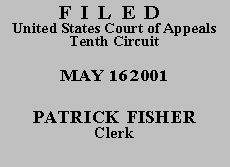

| MARY V. POUNDS, in propria
persona libera lex, federal witness
private attorney general,
Plaintiff-Appellant, v. DEPARTMENT OF INTERIOR; COURT OF INDIAN OFFENSES, CHILDREN DIVISION MIAMI AGENCY, Defendants-Appellees. |
|
Plaintiff-Appellant Mary V. Pounds appeals the district court's order dismissing her action brought pursuant to 42 U.S.C. §§ 1981, 1983, 1985, 1986, and various federal criminal statutes. The district court dismissed Ms. Pounds' complaint for lack of subject matter jurisdiction under Fed. R. Civ. P. 12(b)(1), for improper venue under Rule 12(b)(3), and for insufficient service of process under Rule 12(b)(5). We have jurisdiction pursuant to 28 U.S.C. § 1291, and we affirm.
Ms. Pounds brought this action alleging various violations of her constitutional rights in connection with a decision of the C.F.R. court(1) located in Miami, Oklahoma, granting custody of her three grandchildren to the Eastern Shawnee Tribe (the Tribe). Due to mental instability and substance abuse, Ms. Pounds' daughter, the children's natural mother, relinquished custody of the children to the Tribe. The Tribe placed the children in the temporary Tribe-supervised custody of Ms. Pounds pending a home study. On March 14, 1996, the Tribe revoked Ms. Pounds' custody due to her refusal to cooperate with the Tribe, adjudicated the children as in need of care, and placed legal physical custody with the Tribe. In order to prevent the Tribe from taking custody of the children, Ms. Pounds moved them to various states including Nevada and California. The C.F.R. court issued and enforced an order requiring that the children be returned to the Tribe from Nevada and placed in sheltered care in Oklahoma.
Ms. Pounds then brought a number of actions in an attempt to regain custody of the children. She filed an action in Ottawa County, Oklahoma, which was dismissed for failure to appear; her request to the C.F.R. court to modify the custody order was denied, and she did not appeal; she initiated at least two actions in the Northern District of Oklahoma which were dismissed and not appealed; another petition to the C.F.R. court to regain custody of the children was denied; and she filed an action under the Federal Tort Claims Act in federal district court in the Central District of California which was dismissed. Finally, on May 13, 1999, the C.F.R. court approved the adoption of the children by a Tribe family.
Ms. Pounds then filed this action against the Department of the Interior and the C.F.R. court, alleging that (1) the 1996 orders were illegal; (2) the orders were obtained through deceit and fraud; (3) the C.F.R. court ignored her pleadings and her amicus curiae briefs; (4) the C.F.R. court violated her constitutional rights under the Fourth, Fifth, Sixth, Eighth, Tenth, and Fourteenth Amendments; and (5) the C.F.R. court did not comply with The Indian Child Welfare Act, 25 U.S.C. §§ 1901-63. Defendants filed a motion to dismiss pursuant to Fed. R. Civ. P. 12(b)(1), (3), (5), and (7). The district court thoroughly addressed each of defendants' bases for dismissal, concluding that, pursuant to absolute immunity, the federal court lacked subject matter jurisdiction to entertain Ms. Pounds' claims, service on defendants was insufficient,(2) and venue in the Eastern District of Oklahoma was improper. Ms. Pounds appeals.
We are obligated to construe Ms. Pounds' pro se pleadings liberally. Haines v. Kerner, 404 U.S. 519, 520-21 (1972) (per curiam). Regarding the issue of absolute immunity, we review de novo the district court's dismissal pursuant to Rule 12(b)(1) for lack of subject matter jurisdiction. U.S. West, Inc. v. Tristani, 182 F.3d 1202, 1206 (10th Cir. 1999). We also review a dismissal based on the validity of a forum selection de novo. United States ex rel. B & D Mech. Contractors, Inc. v. St. Paul Mercury Ins. Co., 70 F.3d 1115, 1117 (10th Cir. 1995).
With these standards clearly in mind, we have conducted a thorough review of the briefs, the record, and the district court's order. We conclude that the district court's well-reasoned dismissal decision was correct. Accordingly, we AFFIRM the district court's dismissal for substantially the same reasons given in its September 26, 2000 order.
Entered for the Court
Circuit Judge
*. This order and judgment is not binding precedent, except under the doctrines of law of the case, res judicata, and collateral estoppel. The court generally disfavors the citation of orders and judgments; nevertheless, an order and judgment may be cited under the terms and conditions of 10th Cir. R. 36.3.
1. A "C.F.R. court" is a court created pursuant to Bureau of Indian Affairs regulations to preside over tribal matters in the absence of a court established by tribal government. 25 C.F.R. §§ 11.100; see Tillett v. Lujan, 931 F.2d 636, 638, 640 (10th Cir. 1991). The Shawnee Indian Tribe uses C.F.R. courts.
2. The general rule is that "when a court finds that service is insufficient but curable, it generally should quash the service and give the plaintiff an opportunity to re-serve the defendant." Pell v. Azar Nut Co., 711 F.2d 949, 950 n.2 (10th Cir. 1983). In this case, however, the district court determined that allowing Ms. Pounds to effect proper service of process would be futile, because her claims could not survive defendants' remaining bases for dismissal. The court also declined to address defendants' claims of res judicata and failure to join an indispensable party as unnecessary to the decision.